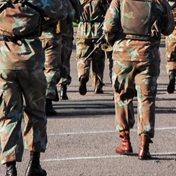The closer the date for the Democratic Republic of Congo’s (DRC’s) election draws, the further the chance of the country holding a peaceful and credible democratic poll slips.
The election is going to be an unusual one – if it is allowed to proceed.
President Joseph Kabila’s chosen successor, Emmanuel Shadary Ramazani, is currently facing EU sanctions, while the people’s popular candidate, Moïse Katumbi, has been barred from returning to the country to take part in the December 23 polls.
Tension is rising. One man died last weekend after protesters demanding the return of opposition leader Katumbi clashed with police.
Several Congolese were killed in protests to ensure democracy in the DRC and to stop Kabila from defying the Constitution by seeking an illegal third term.
After several public demonstrations, Kabila’s spokesperson announced last month that he would not seek re-election.
And now the fight for a credible election is on.
While Kabila has finally appointed a successor in Ramazani, many Congolese see him as a stooge imposed on them to safeguard the ruling dynasty.
It was on Ramazani’s watch as the former interior minister that the country recorded its worst massacres, which saw 80 mass graves being discovered last year in the volatile Kasai region.
Thousands of corpses were deposited there – proof of the killing and burning of countless civilians, journalists and members of the influential Roman Catholic church.
Others have called Ramazani to account for his refusal to allow the return of the body of late fiery opposition leader Etienne Tshisekedi, whose corpse is still holed up in a Brussels mortuary.
He died on February 1 2017.
Observers say Ramazani represents the continuation of corruption and human rights abuses perpetuated by Kabila’s regime.
What affirms this belief among the Congolese is the ruling party’s banning Katumbi from returning to the country to run in the polls.
And the latest legal jab comes from the electoral commission’s barring of former Congolese vice-president and warlord Jean-Pierre Bemba from entering the presidential race. This has not gone down well with many citizens.
The ruling coalition is determined to stay in power, and keeping Katumbi out of the country is the only way to do so.
But the Congolese people have declared: “No Moïse, no election”.
Last weekend, citizens in North Kivu, a predominantly Swahili-speaking part of the eastern Congo, took to the streets to protest against Katumbi’s absence and demand that the former Katanga governor be allowed to return unconditionally and participate in the polls.
Unlike other candidates, Katumbi enjoys considerable popularity across the vast central African nation.
Given the chance in a free and fair election, Katumbi would be expected to sweep to victory in his home region of Katanga, where he enjoys an almost 100% following. He also has considerable backing in the eastern and western parts of the country, while the capital, Kinshasa, could weigh strongly in his favour.
Katumbi’s biggest challenge is parts of the central region, particularly Kisangani and Mbuji Mayi, where Tshisekedi’s legacy is strong among the Luba-speaking population in the Kasai area.
The late long-time opposition leader still holds sway in the central parts of Congo. His son, Felix, who is also a candidate, will most likely sweep the votes in that region and gain considerable numbers in Kinshasa.
And, with the possibility of the younger Tshisekedi and Bemba joining forces to back a Katumbi candidature, Kabila is afraid.
The Catholic Church has also stepped in, demanding the return of Katumbi. In its evaluation report to the UN Security Council on the situation in the Congo, the influential Catholic grouping, the National Episcopal Conference of Congo, known as Cenco, expressed dissatisfaction with developments ahead of the polls.
Cenco was instrumental in getting the St Sylvestre Agreement ratified two years ago. The accord’s main principles stipulate that Kabila not seek a third term in office and that elections be held.
In addition, the Catholic bishops, the opposition and government had agreed in the accord to allow Katumbi to return to the country unconditionally to participate in the elections.
The bishops have warned that the nomination process would be null and void if the government failed to uphold the accord.
“The nomination was carried out in a peaceful atmosphere and in a patriotic spirit, except for the case of Mr Moïse Katumbi, for whom we remind the government about the need to respect the ... St Sylvestre Agreement,” a report signed by Cenco president Bishop Marcel Utembi Tapa states.
The bishops are demanding “the immediate publication of provisional lists of enlisted persons [voters’ roll]”.
The Southern African Development Community (SADC) has also expressed concern. Zambia’s President Edgar Lungu recently announced that he was placing the security situation in the DRC at the top of his agenda.
Lungu was recently nominated as incoming chairperson of the Troika Organ on Politics, Defence and Security.
Lungu said both the African Union (AU) and SADC were concerned with the situation in the DRC and were taking steps to ensure that a peaceful and credible poll would be held.




 Publications
Publications
 Partners
Partners










